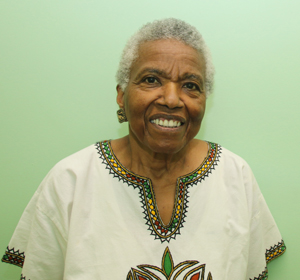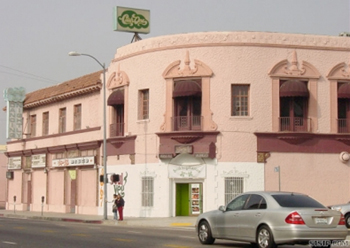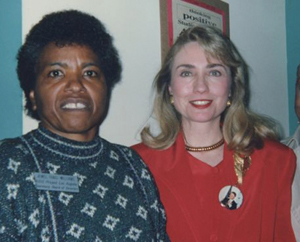JEWEL'S CATCH ONE NIGHTCLUB CLOSING
- Details
- Category: Featured Resident
- Published on Friday, 17 October 2014 17:14
- Written by Chelsee Lowe

When she opened Jewel’s Catch One nightclub (considered the longest running nightclub in L.A.) in 1973, Thais-Williams motivation was two-fold. As an entrepreneur, she was aiming to start a sustainable business; as an activist, she wanted that business to be a safe venue for fellow members of the gay and lesbian community. Years before she set foot in the Pico Boulevard club, Thais-Williams had worked across the street at a neighborhood market, and the then-owners of the bar were openly discriminatory.
“They made it very clear that they didn’t want black folks in there drinking, and I had this fleeting idea that one day I’d own that place and that everyone would be welcome,” she said. “Needless to say, I didn’t sleep much the night I learned it was for sale.”
The club began as a smaller venue, initially occupying just the first floor of the multi-level 1923 structure. Over time, the bar’s success allowed Thais-Williams to grow the business, until she eventually owned the entire building. The club shined bright during the disco era and beyond, hosting thousands of guests, musicians and actors. Scenes from “Pretty Woman” and “Beaches” were shot there. In Thais-Williams’ mind, she has carried on the tradition of the building. Long before she owned it, Ella Fitzgerald and Nat King Cole were among those who graced its stages.
Thais-Williams has continued to run the club despite an obvious decline in business. Only recently has she considered selling the property — a bittersweet prospect, as she’s worked within its walls for more than 40 years. At the same time, she’s ready to focus on her clinic, the Village Health Foundation.
“The need [for the club] isn’t there anymore,” Thais-Williams said. “The population was gay and lesbian for most of the years — though everybody came, including straight people and stars — but now the community can go anywhere they want to. And now, even when I come out on a Saturday night, no one’s dancing, no one’s talking. They’re all standing on the edge of the room and all you see is white lights, screens.”
Born in 1939 in Geary, Indiana and the fifth of seven children, Thais-Williams says that she has always had an entrepunerial spirit. When she was 9 years old, she started working in her uncle’s corner store in San Diego, where the family had moved after hearing utopian stories of life on the West Coast. She also sites her mother as a driving force in her life.
“My mom was a tyrant,” said Thais-Williams. “Some parents don’t know any better, and my mother was one of them. She’d say, ‘you’re not gonna be nothin’.’ In some instances, that would have worked in the reverse and the kids would have rebelled, but in us she instilled a drive to prove her wrong. We were always over-achievers. We were also afraid that she would kill us if we didn’t succeed.”
Eventually her older siblings landed in Los Angeles. When Thais-Williams was accepted to UCLA in 1957 with a small scholarship from a black sorority, she moved to town and shared a house near Orange Avenue and West Haven Street with her brothers and sisters. But after one year of pre-pharmacy classes, she dropped out.

“I couldn’t envision myself counting pills and making cough syrup for the rest of my life,” Thais-Williams said. “I also didn’t have money to continue. But I always had the desire to finish school, mainly because I wasn’t supposed to.”
Thais-Williams tried on a number of hats in the years that followed, jumping from job to job while continuing her education (she eventually graduated from UCLA in 1971 with a BA in History). She worked in retail shops and more markets. Briefly, she was a sheriff at Sybil Brand Institute, the now-defunct women’s prison on Terminal Island, but seeing the same women cycle in and out of the facility was discouraging. One day, she turned in her badge and walked out. Soon after, she went into business for herself for the first time, opening a women’s clothing manufacturing shop with her sister. A recession took its toll, however, and the shop eventually closed. The thought of opening a nightclub — which she thought just might be recession-proof — came not long after that.
Running the club was the first job Thais-Williams kept for longer than a year and a half. She ran the business for more than 25 years before she felt compelled to try something new again.
“At other jobs, I just got bored,” said Thais-Williams. “In the market, I’d memorize prices and check faster than anybody in the world, and bag just as fast. I had to do something to keep my sanity. The bar was different, because something was always changing. I pretty much saw it all in those 25 years. But then I wanted to do something more productive.”
Still inquisitive about health and nutrition, Thais-Williams connected with a friend of friend who was a Jungian psychologist. After meeting with him for some time and explaining her interest in doing something new, the doctor recommended she talk with an acquaintance who was studying acupuncture. Eventually, Thais-Williams enrolled at Samra University of Oriental Medicine, located in neighboring Koreatown. She was in her early 60s and a student once again.
“After one class, I was hooked,” Thais-Williams said. “I hadn’t been to school in 30 years, so I had to study a lot. But I liked it.
Once she earned her acupuncture license, Thais-Williams and Chung Hee Yi, a friend she’d met in school, started working with AIDS patients at a prevention office near La Brea and San Vicente Boulevards. As fate would have it, that office closed around the same time that the building next to Catch One was finally for sale. Thais-Williams had had her eye on it for nearly 20 years when she finally purchased it and opened her own clinic.

The Village Health Foundation began as three treatment rooms in 2001 but has expanded in size and scope since then. Including Thais-Williams, there are four licensed acupuncturists on staff. Pain management, hypertension, high cholesterol, addiction, allergies and obesity are some of the issues clinic patients are seeking help for. There’s also a mental wellness department and a schedule of health and wellness classes, including yoga and Zumba.
While no one is turned away from treatment at the clinic, the suggested donation for an acupuncture session is $30. There’s also community acupuncture on Saturdays, where the suggested donation is $10. For patients who are unable to pay, Thais-Williams is happy to trade treatment for time volunteered in the clinic.
For years, funds from the bar have helped support the health foundation. Once the club is sold, Thais-Williams will continue her acupuncture practice and, if necessary, use proceeds from the nightclub’s sale to keep the clinic’s doors open.
“We’re starting to make an effort to become more visible. This is what I need to be focused on now.”
For more information about services available at the Village Health Foundation, CLICK HERE or call 323-733-0471
Present Day Photo of Jewel by Dawn Kirkpatrick
Categories
-
Featured Local Business
Fais Do Do. 28 Years Strong
 Standing like a sentinal at the entrance of what I like to refer to as the West Adams Gateway...
Standing like a sentinal at the entrance of what I like to refer to as the West Adams Gateway...
-
Featured Resident
The Editor Discovers Her Remarkable Ancestors
 I was born out of wedlock in 1951 to a beautiful Latvian immigrant woman, Inta Penka. In 1940...
I was born out of wedlock in 1951 to a beautiful Latvian immigrant woman, Inta Penka. In 1940...
-
Featured Teen
Roy Readmond
 While grandparents despair that the younger generation has been captured by twitter, instagram,...
While grandparents despair that the younger generation has been captured by twitter, instagram,...
-
Interviews
NEXT! Dianne V. Lawrence on wrapping up the hard copy of The Neighborhood News
 For 13 years, Dianne V. Lawrence has helmed The Neighborhood News, highlighting noteworthy...
For 13 years, Dianne V. Lawrence has helmed The Neighborhood News, highlighting noteworthy...
-
Leaders, Activists
Anthony Nicholas Remembers Rosa Parks
 This article is reprinted with permission from the World Tribune. For more information on that...
This article is reprinted with permission from the World Tribune. For more information on that...
Today5
Yesterday10
Week24
Month232
All989152
Kubik-Rubik Joomla! Extensions
Yesterday10
Week24
Month232
All989152
Currently are 33 guests and no members online
Kubik-Rubik Joomla! Extensions



